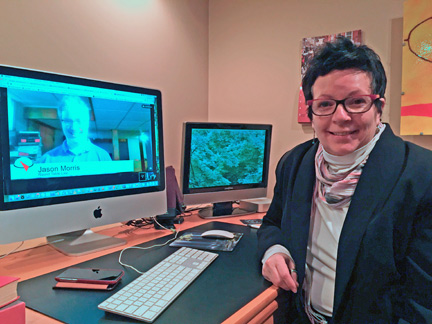
Carolyn Grogan is making history — as far as she knows — as the first articling student at a virtual law firm.
 “I think she must be the first . . . in the history of Alberta,” says Jason Morris of cloud-based law firm Round Table Law.
“I think she must be the first . . . in the history of Alberta,” says Jason Morris of cloud-based law firm Round Table Law.
“If she’s not the first, she would have to be in the first few.”
Round Table is doubling its ranks with Grogan coming aboard, going from a one-man show to “almost two” lawyers with the Alberta firm’s first articling student.
“Carolyn got in touch with me out of the blue and said she was looking for articles and was particularly interested in learning how to operate as a lawyer in a virtual environment and with the technology focus that I use,” says Morris, who has been operating Round Table full-time for almost four years.
“I’ve gotten e-mails from people seeking articling positions before and generally speaking I just delete them because I’m not in the position to take on an articling student in a way you traditionally think about articling students. But Carolyn didn’t sound traditional. Not only was she interested in what I have to offer but I didn’t know where else she could possibly get it.”
Morris says the pair sat down and found solutions to the issues they could see popping up — and that conversation left him with “no reason to say no anymore.”
“Carolyn is familiar and comfortable with the technology and we were able to imagine doing it in a way that would work.”
They both have fully functioning offices in their homes, which let them communicate easily through voice, data, and video.
To hold up his supervisory and counselling responsibilities as principal, Morris says they plan to video conferences every morning to discuss the layout of the day.
Morris also credits the Law Society of Alberta’s June 2015 changes that made taking on an articling student possible for him.
In the past, when a principal and an articling student created the required education plan, they were given a list of subject areas and a minimum number had to be covered, for example wills and estates, real estate, and legislative drafting, to name a few.
“What the law society found — and was hoping to fix — is that this prohibited most lawyers from being able to take articling students because most lawyers don’t work in large, general practice firms dealing with multiple areas. Most work in smaller or solo firms that focus on one area,” Morris says.
“They changed the rules and now the categories you ensure are covered in the course of the articling plan are things like ethics, professionalism, dispute resolution — more generic things that you experience in every law firm over the course of the year.”
The law society’s move makes it possible for smaller and boutique firms to offer articling opportunities to students, he says.
Grogan’s background makes her uniquely suited to her role as virtual articling student. She came to the law as a mature student who had worked at an educational technology company for nine years, with a focus on helping people communicate over distance. Coupled with a masters degree in communications and technology, it seemed natural to her to be interested in a virtual firm.
Morris had a similar experience. He came into the legal profession as a mature student after working in information technology, and believes Grogan can take advantage of his knowledge of that path as well as what she will learn articling.
“The goal I had in mind was to eventually be able to operate as a lawyer with a full understanding of what it takes to run a law firm and work independently and manage one’s own caseload,” says Grogan.
“Morris offered that and I think he believes in helping students get to that point of independence where they can take care of themselves with confidence.”
The duo had to “get creative” about Grogan’s compensation structure because Morris “couldn’t afford to hire an articling student the way a traditional big law firm would hire one, two, or three and maybe keep one,” he explains.
They decided Grogan will receive a percentage of her own billables, a structure that works well for the two of them.
Grogan says there were a few influences on her decision to seek out articles with Round Table. As a law student she says you hear a lot of “horror stories” about the articling process, she explains, and as a mature student she wanted to work a little more independently. But overall, Grogan calls her position “a really exciting opportunity.”
“Jason is at the leading edge of this in many respects,” she says.
Morris says he believes when new and junior lawyers see what the technology is capable of, and that it is possible to operate in an ethical and professional way using it, and also how “incredibly inexpensive” it is compared to running a more traditional law firm, “we’ll see a lot more people doing it this way.”
“There is a category of lawyers for whom this is a really, really good option,” Morris says.
“That includes those who want greater control over their own practice, or who want to start their own firm but can’t sign for three-year office space. It lowers the threshold for entry to practice.”